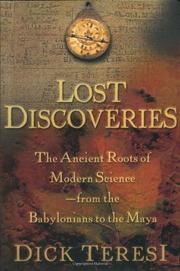

LOST DISCOVERIES
The Ancient Roots of Modern Science--from the Babylonians to the Mayans
by Dick Teresi
The often suppressed or overlooked scientific work of non-Western thinkers is given a clear-eyed airing by science historian Teresi (The God Particle, not reviewed) and found to be deeply impressive.
Teresi thought he’d attempt to show the limited contributions of non-Europeans to the sciences. It was to be a clarifying response to the outlandish claims being posited of the capabilities of ancient sciences, but that aim, says the author, was “overtaken by the pleasure of discovering mountains of unappreciated human industry, four thousand years of scientific discoveries by peoples I had been taught to disregard.” For skeptic Teresi, science is the logical and systematic study of nature and the physical world, usually involving experimentation and theory, with a measure of falsification thrown in, so not just any circumstantial tidbit will do. That he comes up with a whole lot of good stuff in math, chemistry, cosmology, astronomy, physics, geology, and technology is a given: the early Indians’ use of zero and negative numbers, and their enduring atomist theories of matter; Sumerian algebra; remarkable Oceanic star maps and New World optical snakes; Chinese alchemists’ empirical familiarity with the conservation of mass; the vulcanized rubber of the Quechuan Indians; Andean freeze-dried potatoes. What’s at stake is Western scientific heritage and pride, which must now take its place at the table not only with Thales, Aristotle, Galileo, and Newton but with Fu His, the Ishango Bone, the Urdi lemma, and the Tusi couple. Teresi explores the importance of empirically based theorems vis-à-vis proof-based theorems—the Pythagorean triplets relative to the Babylonian triplets, for example, and their respective places in the foundation of algebra—drawing a bead on the philosophical underpinnings of proof methods in different traditions, be they intuitive, rational, empirical, constructivist, analytic, or heuristic, and demonstrating the value of different logical pathways.
The importance and pleasure of science’s multicultural history gets a proper hearing, and a stout set of legs to stand on.